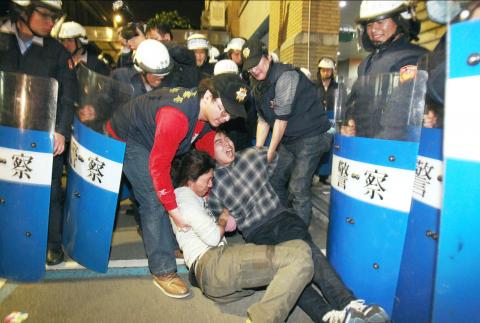Members of the press yesterday accused police of attacking them, when law enforcement officers forcibly evicted protesters occupying the Executive Yuan.
“Reporters, please leave the place. We will soon begin to disperse the crowd,” police officers said to the dozens of reporters at the back gate of the Executive Yuan at about 1am yesterday, as they prepared to evict protesters occupying the compound.
Shortly afterward, police began pushing reporters out of the gate. Moreover, contrary to their earlier statement that members of the media could stand right outside the gate, they kept on pushing the reporters to move further away.

Photo: Wally Santana, AP
The move triggered protests from the reporters, many of whom accused the police of violating freedom of the press. Those who insisted on going inside or just standing by the gate were immediately surrounded by officers and pushed out.
As the police began to disperse the crowd inside the compound, a number of reporters were also dragged or attacked by officers.
“When officers approached me, I showed them my press pass, and repeatedly told them that I am a reporter, but an officer from Nangang Police Precinct would not listen to me,” a newspaper reporter surnamed Chu (朱) said after he was evicted. “He kicked me in the back and hit me with his fist.”
Not long after, shouting could be heard from the Executive Yuan’s back gate.
“How could you do this to journalists? You hit my cameraman, pulled him away, and then also dragged me away from the scene,” a TV reporter yelled at officers near the gate. “You always say you are protecting reporters. Is this how you protect us?”
More than a dozen similar incidents were reported, with a number of reporters suffering serious injuries such as bone fractures.
At nearly 5am, when police were moving on to evict protesters occupying an annex building, a line of officers pushed forward, forcing reporters away from the scene and into the pressroom.
Some later heard reports that police had decided to clear the pressroom as well. However, a senior reporter helped to negotiate with police to allow reporters to stay in the room.
The Association of Taiwan Journalists (ATJ) yesterday condemned the police for using violence against members of the media.
“The ATJ has received more than 10 cases of attacks on media reporters by the police during the student occupation of the Executive Yuan. The ATJ condemns the police for using violence against the media and violating the freedom of the press,” an ATJ statement said.
“We also strongly protest the police’s decision to disperse media reporters before dispersing the protesters. We suspect that the objective is to block the media from reporting the truth. This is a serious violation of the freedom of the press, and the worse example set in a democratic society,” the association said.
Later yesterday, when asked by the Taipei Times about the police action, which blocked reporters from covering their move to break up the protest, Premier Jiang Yi-huah (江宜樺) said he told National Police Agency Director-General Wang Cho-chiun (王卓鈞) that the police had to make sure to ask reporters to leave before they started crowd dispersal measures so that reporters would not get hurt by water cannons.
“If there were reporters who were pushed when they were trying to secure a better place to take photos, I am sorry, but I wanted every reporter to be safe while they they were working,” Jiang said.
Additional reporting by Shih Hsiu-chuan

Beijing could eventually see a full amphibious invasion of Taiwan as the only "prudent" way to bring about unification, the US Department of Defense said in a newly released annual report to Congress. The Pentagon's "Annual Report to Congress: Military and Security Developments Involving the People's Republic of China 2025," was in many ways similar to last year’s report but reorganized the analysis of the options China has to take over Taiwan. Generally, according to the report, Chinese leaders view the People's Liberation Army's (PLA) capabilities for a Taiwan campaign as improving, but they remain uncertain about its readiness to successfully seize

Taiwan is getting a day off on Christmas for the first time in 25 years. The change comes after opposition parties passed a law earlier this year to add or restore five public holidays, including Constitution Day, which falls on today, Dec. 25. The day marks the 1947 adoption of the constitution of the Republic of China, as the government in Taipei is formally known. Back then the Chinese Nationalist Party (KMT) governed China from Nanjing. When the KMT, now an opposition party in Taiwan, passed the legislation on holidays, it said that they would help “commemorate the history of national development.” That

Taiwan has overtaken South Korea this year in per capita income for the first time in 23 years, IMF data showed. Per capita income is a nation’s GDP divided by the total population, used to compare average wealth levels across countries. Taiwan also beat Japan this year on per capita income, after surpassing it for the first time last year, US magazine Newsweek reported yesterday. Across Asia, Taiwan ranked fourth for per capita income at US$37,827 this year due to sustained economic growth, the report said. In the top three spots were Singapore, Macau and Hong Kong, it said. South

Snow fell on Yushan (Jade Mountain, 玉山) yesterday morning as a continental cold air mass sent temperatures below freezing on Taiwan’s tallest peak, the Central Weather Administration (CWA) said. Snowflakes were seen on Yushan’s north peak from 6:28am to 6:38am, but they did not fully cover the ground and no accumulation was recorded, the CWA said. As of 7:42am, the lowest temperature recorded across Taiwan was minus-5.5°C at Yushan’s Fengkou observatory and minus-4.7°C at the Yushan observatory, CWA data showed. On Hehuanshan (合歡山) in Nantou County, a low of 1.3°C was recorded at 6:39pm, when ice pellets fell at Songsyue Lodge (松雪樓), a